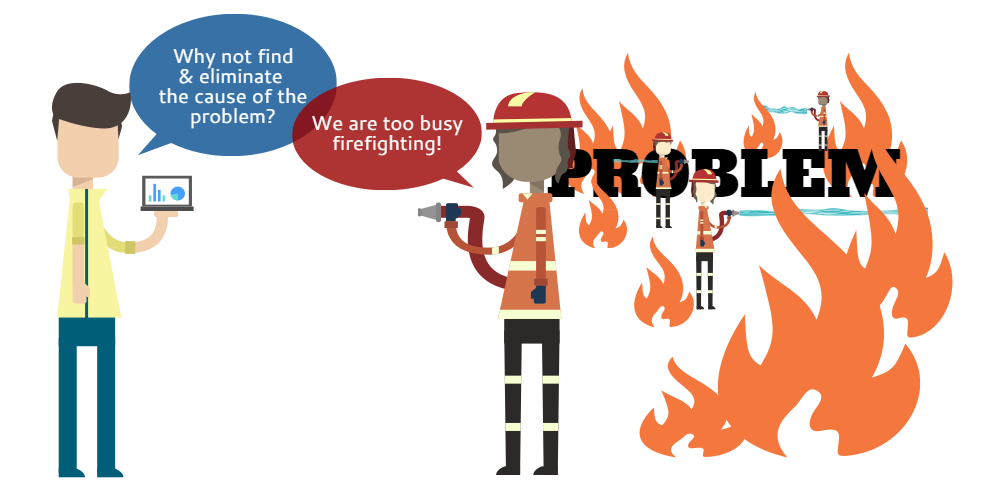- Mike Titchen
- June 13th, 2016
Is your company great at implementing solutions? Do you work tirelessly to come up with next brilliant solution, or maybe you’re on the front line with your team, putting out the fires caused by those pesky problems?
What if I told you that you might be part of the problem?
By not questioning whether the solution is truly solving the problem, you are likely doing more damage than good. But you’re not alone; all too often, businesses jump from project to project, filled with good intentions but armed with poorly formed solutions. They spend vast quantities of cash and consume endless amounts of staff time as they go, barely looking back to see if the solution is successful or sustainable. They are implementing plenty of solutions, but they are not solving any problems, and the fires they are putting out are likely to come back bigger and badder than before.

Here are just a few examples I have seen:
- A manager of an insurance company became aware that they were missing their Service-level agreement. The solution was to reduce the workload of the back office by giving some of the work to the front office. However, as this did not decrease the overall workload, simply divided it, this solution not only made the SLA even worse but also increased costs.
- A series of projects by a regulatory organisation were consistently running late and over budget. The solution implemented was a new piece of project management software, costing tens of thousands of pounds. Not only did the original problems persist, but the team also struggled to use the software, leading to even later projects than before.
- A security printing company wanted to reduce its high levels of scrap rates. The company invested in replacing its fully automatic cutting and packing machines with manual guillotines to enable more control. However, the scrap rates remained unchanged.
In each situation, the company spent time and money implementing a solution, but never questioned whether it would solve the problem.
How do we solve this problem?
We need to stop firefighting and find the root cause instead. It’s simple; cut the weed in the garden, and it will pop up again and again. Pull it out by its root, and it will be gone for good!
- Before implementing a solution, the manager in the Insurance company should have asked,“Why are we missing our SLA?”. This question should have been asked persistently until they got to the root cause. They would have realised that splitting the task between the front and back office would do nothing to shorten lead time, and possibly even predict the disruption and money it would waste.
- The manager in the regularity organisation needed to ask, “Why are our projects running late and over budget?”. They should have kept asking until the root cause was identified. It would have become apparent pretty quickly that the software would not fix the problem.
- If the manager in the security printing business invested time asking why there was a scrap problem, they would have eventually found the root cause. They would also have realised that spending millions moving to manual guillotines would probably exacerbate the problem.
Getting into this mindset of starting with the problem and not the solution can be difficult at first. It requires patience and perseverance, but it works.
By training in Lean Six Sigma, you will develop this mindset. People often ask me what the difference is between a Lean Six Sigma organisation and other originations, or what the real value of Green and Black Belt training is.
My answer is that Lean Six Sigma is a mindset, and it is this that sets Lean Six Sigma organisations and individuals apart from the rest. This mindset always goes to the root of the problem, knowing the right questions to ask and when to ask them. Their training has provided them with the tools and structured technique to solve the problems, and only then do they work to implement the right solution.
In the long run, learning to eliminate problems takes less time, effort, and resources than the current firefighting routine that is exhausting you and your team. Hang up the hose and take the first steps to developing this problem-solving mindset with our FREE Lean Six Sigma online course, or get in touch on 0800 066 3749.



